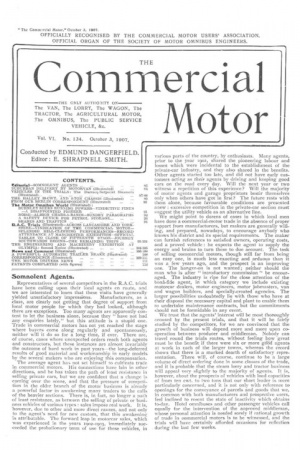Somnolent Agents.
Page 1

If you've noticed an error in this article please click here to report it so we can fix it.
Representatives of several competitors in the R.A.C. trials have been calling upon their local agents en route, and we are interested to learn that these visits have generally yielded unsatisfactory impressions. Manufacturers, as a class, are clearly not getting that degree of support from local motor people for which they had looked, although there are exceptions. Too many agents are apparently content to let the business alone, because they "have not had any enquiries lately,” but this attitude is a stupid one. Trade in commercial motors has not yet reached the stage where buyers come along regularly and spontaneously, neither will it do so for a long time, if ever. There are, of course, cases where unexpected orders reach both agents and constructors, but these instances are almost invariably the outcome of hard work in past years—the long-deferred results of good material and workmanship in early models by the several makers who are enjoying this compensation.
The average agent has not set himself to cultivate trade in commercial motors. His connections have lain in other directions, and he has taken the path of least resistance in selling private cars, but we are confident that a change is corning over the scene, and that the pressure of competition in the older branch of the motor business is already a powerful factor in awakening many traders to the calls of the heavier sections. There is, in fact, no longer a path of least resistance, as between the selling of private or business vehicles of various types : sales impose real work. It is, however, due to other and more direct causes, and not only to the agent's need for new custom, that this awakening is attributable. The forward leap in motorcar sales, which was experienced in the years 1902-1903, immediately sue.ceeded the probationary term of use for these vehicles, in
various parts of the country, by enthusiasts. Many agents, prior to the year 1902, shared the pioneering labour and losses which were incidental to the establishment of the private-car industry, and they also shared in the benefits. Other agents started too late, and did not have early customers acting as their agents by driving and keeping good cars on the road every day. Will the next year or two witness a repetition of this experience? Will the majority of motor agents and garage proprietors bestir themselves only when others have got in first? The future rests with them alone, because favourable conditions are presented anew : excessive oompetition in the private-car section must suggest the utility vehicle as an alternative line.
We might point to dozens of cases in which local men have done a commercial-motor trade in the absence of proper support from manufacturers, but makers are generally willing, and prepared, nowadays, to encourage anybody who knows his district and its special requirements. The maker can furnish references to satisfied owners, operating costs, and a proved vehicle : he expects the agent to supply the energy and brains to turn these to due account. The task of selling commercial motors, though still far from being an easy one, is much less exacting and arduous than it was a few years ago, and the prospect is an improving one. The hanger-on is not wanted; neither should the man who is after "introductory commission " be encouraged. The industry is ripe for the close attention of the bona-fide agent, in which category we include existing motorcar dealers, motor engineers, motor jobmasters, van and wagon builders, and specially-created agencies. The larger possibilities undoubtedly lie with those who have at their disposal the necessary capital and plant to enable them to undertake maintenance contracts, but the commitments should not be formidable in any event.
We trust that the agents' interest will be most thoroughly aroused by the present trials, and that it will be fairly studied by the competitors, for we are convinced that the growth of business will depend more and more upon cooperation between producer and middleman. Nobody can travel round the trials routes, without feeling how great must be the benefit if there were six or more gded agents at work in each of the larger towns, whereas the record shows that there is a marked dearth of satisfactory representation. There will, of course, continue to be a large volume of direct ordering done in some classes of the trade, and it is probable that the steam lorry and tractor business will appeal very slightly to the majority of agents. It is, however, about the prospects of vehicles with load capacities of from ten cwt. to two tons that our short leader is more particularly concerned, and it is not only with reference to openings for the conveyance of parcels and goods that we, in common with both manufacturers and prospective users, feel inclined to resent the state of inactivity which obtains to-day. Hotel omnibuses and other passenger vehicles call equally for the intervention of the approved middleman, whose personal attention is needed sorely if rational growth of trade in commercial motors is to be witnessed, and the trials will have certainly afforded occasions for reflection during the last few weeks.




























